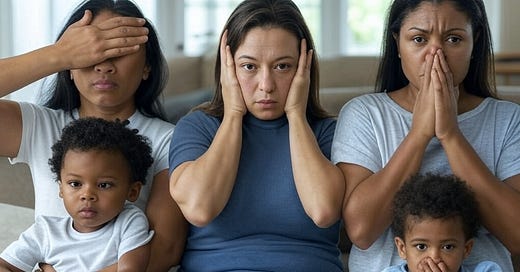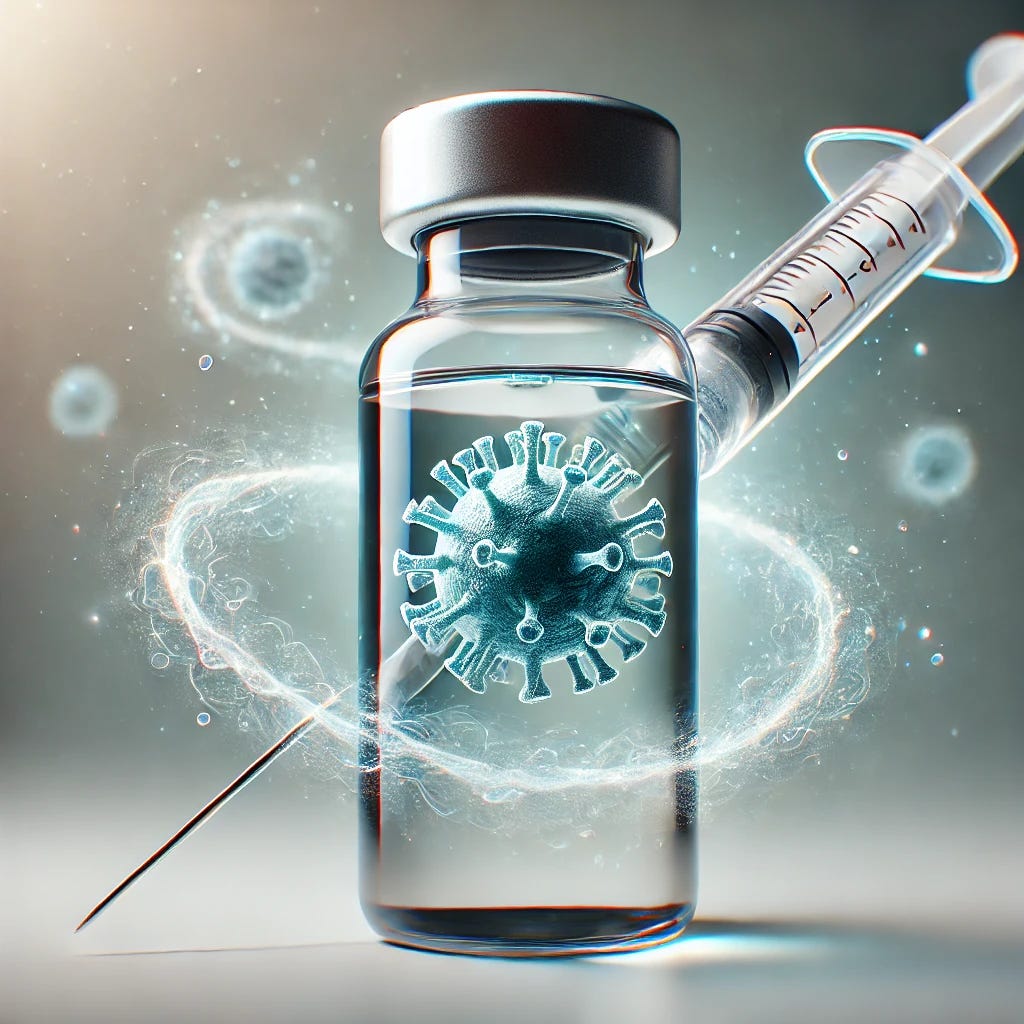The Vaccine Conversation No One Wants to Have
Risks, Responsibility, and the Right to Ask Questions
For my family, vaccines are not just a consideration—they are often a necessity. With my son and daughter’s preexisting health challenges, including cystic fibrosis and my son’s transplant, preventing serious illness—and sometimes even mild infections—is imperative. Growing up a common virus or pathogen for one and could even mean hospitalization for both. I don’t take these decisions lightly, as you can imagine, because they could mean life or death for my kids. But I also don’t take them blindly now. We personally choose to vaccinate for our family for most things due to our personal situation, but mitigation is key in our decisions, as it should be for all.
The Reality of Vaccine Side Effects: Ignored, Silenced, and Dismissed
Over the recent years, I’ve met many people who have experienced vaccine side effects. Some were mild and temporary, while others were severe and lasting. I’ve listened to their stories, seen their pain, and watched as they were cast aside—dismissed, ignored, censored and sometimes even ridiculed for daring to say, “This happened to me.” The reality is that side effects do happen, even if they affect a small percentage of people. But how can we even know how small that percentage is if there isn’t a proper tracking system and people are shamed into silence?
This issue has fractured families and friendships, deepening distrust in public health institutions. Open conversations should be encouraged, not shut down. Instead, vaccine injury discussions are often labeled conspiratorial, as if acknowledging harm undermines the entire system rather than revealing areas that need reform.
Who Pays for Vaccine Injuries? The Hidden Truth Behind the Compensation System
The Vaccine Injury Compensation Program (VICP) is a little-known piece of this puzzle. Established in 1986, it shields vaccine manufacturers from liability. If someone suffers a severe reaction, they cannot sue the manufacturer. Instead, there is a federal compensation fund that pays out settlements—but only if the injured person can successfully prove their case in what is often called “vaccine court.” And where does this compensation money come from? Not the pharmaceutical companies. A tax is placed on every vaccine dose, meaning the public foots the bill through higher insurance rates or taxes, leaving the vaccine makers free of liability. This seems somehow wrong, at least should be questioned.
Since its inception in 1988, the VICP has paid out over $5 billion to individuals and families who have suffered vaccine-related injuries. While this program exists to provide a safety net, the burden of proof is placed on the injured party, and the claims process can be long and difficult. Many families struggle to navigate the system, often requiring legal assistance and extensive documentation to receive any compensation at all.
Are We Really Healthier? The Bigger Picture Beyond Infectious Disease
Since 1986, the number of vaccines on the childhood immunization schedule has increased significantly, with new shots added to prevent diseases like pneumococcal infections, HPV, rotavirus, and meningitis. This expansion has coincided with a push for widespread vaccination, aiming to reduce communicable diseases. But are we truly healthier as a result? Has there been a drastic increase in infectious disease that necessitated this level of intervention, or has public health shifted its focus toward eliminating even mild illnesses without fully considering the long-term consequences?
While vaccines have undoubtedly reduced cases of certain infectious diseases, overall health outcomes in the U.S. paint a more complex picture. Chronic illness rates have skyrocketed, autoimmune disorders are more prevalent than ever, and childhood conditions like allergies, asthma, neurological disorders, and metabolic diseases have surged. Life expectancy in the U.S. has actually declined in recent years, particularly among younger populations, while rates of cancer—especially in younger adults—have risen sharply. Though these trends are not necessarily a direct result of increased vaccination, they warrant deeper investigation. The question should not just be whether vaccines prevent the targeted disease, but whether they contribute to overall health and resilience. Are we focusing so much on preventing individual illnesses that we are overlooking the broader picture of immune system function?
Perhaps a different approach—one that prioritizes immune system health through improved nutrition, reduced environmental toxins, and lifestyle changes—could make a profound difference. A well-functioning immune system is built through exposure, nourishment, and balance, yet modern medicine has increasingly turned to pharmaceutical intervention as the primary means of disease prevention. Are we addressing the root causes of illness, or simply creating a society where we rely on an ever-expanding list of injections to stay afloat? These are critical questions that deserve serious discussion, not dismissal.
Live Vaccines and Shedding: A Risk No One Talks About
Then there’s the often-overlooked issue of live vaccines and shedding, which adds another layer of complexity to the conversation. Certain vaccines—such as the rotavirus, oral polio (used in other countries), MMR, varicella (chickenpox), and FluMist—contain weakened live viruses that replicate in the body and can be shed through saliva, nasal secretions, or stool. While this poses little risk for most, it can be dangerous for immunocompromised individuals like my son. Transplant recipients, chemotherapy patients, and those with suppressed immune systems may be at risk of serious complications from exposure to a recently vaccinated individual.
And yet, this risk is rarely discussed or disclosed. Doctors typically don’t warn families with immunocompromised members about potential exposure risks, nor are the recently vaccinated advised to take precautions. If public health officials are serious about building trust, these are the kinds of conversations that should be happening—not just to encourage vaccination but to make sure those at risk can protect themselves accordingly.
Why Is Asking Questions Considered Dangerous?
Another glaring issue is the lack of transparency in the information provided to consumers. When receiving a vaccine, most people are given a small sheet summarizing potential side effects—something I often compare to a coloring page of mild reactions like redness or swelling at the injection site. But the full insert, which includes known risks, contraindications, and clinical trial data, is rarely given or even offered. Why? Shouldn’t every patient, especially parents making choices for their children, have access to this information?
Public health depends on preventative care, and vaccines are a key part of that. But the reality is far more complex than what is often presented. The media frequently highlights the dangers of not vaccinating—rising case numbers, hospitalizations, and, tragically, deaths. But how has that actually impacted the population in question? What are the survival and complication rates? And why is it taboo to discuss the risks on the other side of the equation? If we cannot have open conversations about our health with our providers and our communities, then something has to change.
Many people are choosing not to vaccinate—not because they reject science, but because they feel they are being forced to make a decision in the dark. They are told to trust the system while being denied full access to the data. I’ve even heard arguments that discussing these concerns openly will result in fewer people getting vaccinated, so we should stay quiet. That speaking about risks is dangerous. But isn’t silence even more dangerous?
That kind of thinking—the belief that open discussion about vaccine risks or nuances will somehow lead to mass death and the return of plagues—reflects a deep-seated fear rather than a rational approach to public health. I’ve even heard family and friends openly say that if we speak about these complexities, the “stupid” people won’t understand and will stop vaccinating, putting everyone at risk.
This mindset reveals a troubling assumption: that the general public is incapable of critical thinking, that people must be shielded from certain information for their own good, and that questioning or debating these topics is inherently dangerous. But isn’t suppressing discussion and information far more dangerous? When people feel they are being manipulated or misled, they are more likely to reject entire systems—not just individual recommendations.
When one lives in a cave, their imagination can run wild. Shadows on the wall can morph into monsters, and fear can replace reason. The same happens when information is restricted—people start filling in the blanks with whatever theories make the most sense to them, and that is what fuels actual harmful conspiracies. When people don’t have access to open discussion, they don’t stop thinking—they just turn elsewhere for answers, sometimes to sources that thrive on fear rather than facts.
We are told that we should “leave it to the smart people”—that scientists, doctors, and public health officials know best, and the rest of us should simply follow their guidance without question. But history has repeatedly shown that blind trust in authority is not the same as true understanding, and it certainly isn’t a substitute for informed consent.
This kind of thinking assumes that intelligence and expertise exist in a vacuum—that only a select group of people are capable of weighing risks and benefits, while everyone else is too uninformed or unqualified to participate in the conversation. But critical thinking isn’t limited to experts, and the idea that everyday people can’t or shouldn’t engage in these discussions is both condescending and dangerous.
The New High Priests: Science, Authority, and the Danger of Blind Trust
In many ways, science has morphed into a modern religion, adopting the same hierarchical structure as organized faith. There are high priests—the leading scientists, government agencies, and pharmaceutical executives—who decree what is truth. There are sacred texts—peer-reviewed studies, which, though valuable, are often treated as infallible despite scientific knowledge constantly evolving. There are the unquestioning followers—those who repeat the mantras of “safe and effective” without ever reading beyond a headline. And there are the heretics—those who ask too many questions, labeled as anti-science or conspiracy theorists, regardless of their credentials or the validity of their concerns.
But this isn’t new. History is filled with examples of centralized knowledge being controlled by a select few, with devastating consequences for those who dared to challenge the established order. During the Middle Ages, the Catholic Church held immense power over the interpretation of knowledge, particularly through the Latin Bible. Clerics and high priests were the only ones allowed to read and interpret the sacred texts, ensuring that the average person remained dependent on their authority for understanding truth. Questioning the church’s interpretation of scripture was not only frowned upon—it was heresy, punishable by excommunication or worse.
The Spanish Inquisition stands as one of history’s starkest examples of what happens when authority is left unchecked and dissent is criminalized. It was not just about religion—it was about control. Those who spoke out, questioned dogma, or held beliefs outside of sanctioned doctrine were persecuted, tortured, and often executed. Many of these so-called heretics were simply people seeking knowledge, understanding, or freedom of thought, yet their desire to challenge the prevailing narrative was seen as a direct threat to the established order.
Are we so advanced that we are incapable of repeating these patterns? Human history suggests otherwise. While we may pride ourselves on being more rational and enlightened today, the tendency to consolidate knowledge and power into the hands of a few while suppressing dissent remains deeply ingrained in human behavior. Science, once a tool for inquiry and discovery, has increasingly been weaponized in a way that resembles the rigid orthodoxy of religious institutions past. Instead of encouraging open debate, those who question prevailing scientific narratives are ostracized, censored, and labeled dangerous. Instead of fostering curiosity, we are told to simply trust the experts and accept their conclusions without question.
Yet, science—at its core—is not about consensus, authority, or unwavering belief. It is a process. It is built upon questioning, testing, refining, and sometimes even rejecting old ideas in favor of new evidence. When we treat science as an unquestionable institution rather than a living, evolving pursuit of truth, we are no different from the societies that silenced Galileo for suggesting that the Earth revolved around the Sun.
We are expected to research and make educated decisions about everything from financial investments to education choices to what we put in our bodies. Why should medical decisions—especially those involving interventions for ourselves and our children—be any different? If a medical recommendation is truly in our best interest, then it should be able to stand up to scrutiny, discussion, and questioning.
Saying “just trust the experts” isn’t a solution—it’s an appeal to authority that discourages people from thinking for themselves. In reality, the more transparency there is, the more trust can be built. People don’t reject information because they are unintelligent; they reject it when they sense they aren’t being told the full truth.
The real danger is not in questioning authority—but in failing to.
We cannot operate under the belief that full transparency will lead to chaos. If public health decisions are truly based on sound science, then that science should be able to withstand scrutiny, debate, and open discourse. Informed consent requires not just access to information, but the freedom to ask questions without being mocked, silenced, or labeled irresponsible.
A Path Forward: The Need for Honest, Open, and Nuanced Discussion
The reality is, people are already making choices in the dark because they sense that the full story isn’t being told. If the goal is to maintain trust in vaccines and public health, the solution isn’t less discussion—it’s more.
And not all vaccines are the same. What are we preventing on an individual level? Are we dying at high rates from chickenpox? Why is a newborn given a hepatitis B vaccine within 24 hours of birth—a sexually transmitted disease—when the mother has already been tested and vaccinated against it? How is Gardasil, which prevents HPV, the same as a measles shot? These are reasonable questions. And we should be able to ask them freely.
If we truly care about public health, then we need honest discussions, real data, and transparency—not fear tactics, shame, and suppression. The decision to vaccinate should be an informed choice, and the fact that so many people feel they can’t have this conversation without backlash is a sign that something has gone deeply wrong.












